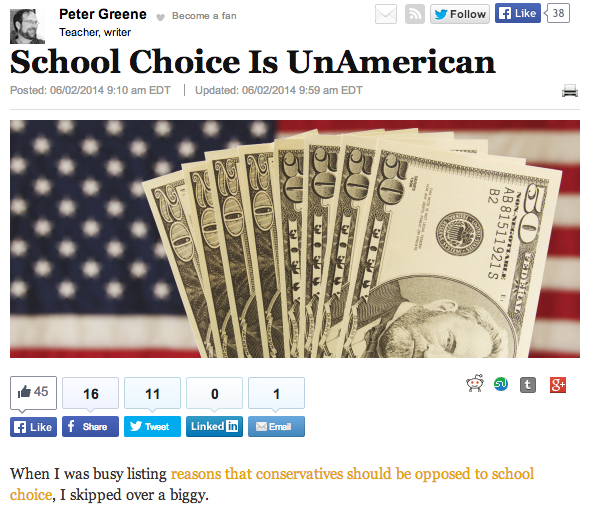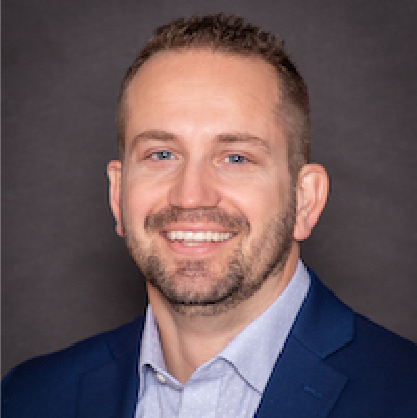Friday Freakout: School Choice is UnAmerican
Should taxpayers be compelled to fund schools that teach concepts that support “junk science” or violate their convictions?
Teacher/blogger Peter Greene thinks that is un-American, and he followed up a few days later on the Huffington Post to claim that as his fifth reason “conservatives should hate school choice.” So here I am, back to respond to his belated claim in today’s Friday Freakout.

“Schools are not a service for parents. The people who produced the student are not the only “customers” for the school.
The educated human who emerges from school will become a neighbor, an employee, a parent, a spouse, a voter, a (one hopes) involved citizen, a person whose job will contribute in some way to the life of the community. Everybody who will ever deal with her in any of those capacities shares the benefits of that education. They are all “customers” of public education. Whether they are relatives of the educatee or not is hardly the point.
We all have a stake in public education.
In many ways, I agree with that statement. As a society, we all benefit from educated citizens. That is why we operate a public education system; but, that is not an argument against school choice. Public financing does not necessitate public operation of the schools.
Public education is the idea that all kids deserve a quality education at public expense. If students in school choice systems receive a quality education, then those choice schools—even the private schools—are helping to advance the cause of public education.
What about Greene’s objection that some private schools may teach creationism or some other objectionable material?
For as long as anyone can remember, there have been disagreements about what is being taught in public schools. That is because parents are compelled to send their children to public schools—if they can’t afford something different—and taxpayers are compelled to support public education through their tax dollars.
However, individuals have different values and beliefs. Of course, when parents disagree with their child’s public school they can pay for private school tuition, accept the school’s actions, or seize control and make the school change its position. Still, in all three of those scenarios, some people are being compelled to fund a school that teaches material with which they disagree.
There is simply no getting around the fact that someone’s beliefs or conscience will be compromised in the levying of taxes to support education.
With one particular form of school choice—tax-credit scholarships—that issue can be avoided. Tax-credit scholarships do not compel individual taxpayers to fund or support schools they may find objectionable. In fact, the U.S. Supreme Court ruled that opponents of Arizona’s tax-credit scholarship program did not have standing because the tax credits are not government spending.
Tax-credit scholarships are funded through individual and corporate donations. The individual is not compelled to donate his or her money; he or she chooses to do so. The donations never enter the government treasury and the funds are not distributed by a government agency. Other than an all-out private system, where everyone pays for their own child’s education, this is about as close as we can come to a system that does not compel individuals to subsidize schools to which they object.
The distinction between tax-credit scholarships and other private school choice programs is an important one, but is somewhat beside the point. The fact remains that it is impossible to create a school that is perfectly neutral when it comes to every person’s beliefs, values, and convictions.
Therefore, do those who oppose private school choice for this reason believe their rights are more important than others who object to content in public schools—but are compelled to support them anyway?
When the district where I taught banned Slaughterhouse-Five and Twenty Boy Summer, few progressive thinkers applauded the district for acquiescing to a parent’s wishes. They deemed the district backwards and lampooned the individual who led the effort to ban the books.
Peter Greene and other opponents of school choice programs might not mind Philadelphia’s decision to include A People’s History of the United States—a highly controversial book written by socialist Howard Zinn—in the public school curriculum, but many people do mind.
Greene does not seem interested in protecting all citizens from being compelled to fund schools that violate their beliefs, only the ones that think like he does.
Furthermore, he says,
“Do you think it’s a bad idea for a student to attend Flat Earth High School or Racial Purity Elementary School or God Is Dead Day School? Well, under school choice, if you don’t have a kid, you don’t have a voice. Too bad for you.”
Beside the fact schools like the ones he mentioned don’t exist, he ignores one important function of community and local control. If someone ever wanted to open a school that teaches one race is superior or the earth is flat or “God is dead” or terrorism is a great profession, first they would have to comply with laws. (That eliminates schools that teach terrorism and racism.) If somehow their radical ways still manage to slip through, the public has the power to keep them out of their communities. Best of all, they can choose not to send their children there. And if private schools such as those can’t fill their classrooms even when every parent has the financial means to choose them, they simply won’t persist—bottom line.
What about the loss of “local control”?
Greene likes to hold a traditional school system, with democratically elected boards, up in nostalgic reverence: “Local control of schools used to be one of the last remaining arenas in which regular folks, regular taxpayers still had a say.” I can tell you from experience that “local control” means very little to the family that is dissatisfied with their child’s school.
Although Greene seems to get the point that public education is about providing a quality education to students, he continually misunderstands this implication. He thinks “public education” must be publicly operated and publicly governed by democratically elected boards. That is a system; it is not public education.
School choice does not remove the “public” from “public education”; it simply shifts the oversight and responsibility from a few politically connected board members to the individuals themselves. There are plenty of examples of this type of governance, including in pre-kindergarten and higher education, where public dollars go to students and parents who then choose private institutions that are not governed by a democratically elected board. Few cry foul when a Marine uses his or her GI Bill to attend the University of Notre Dame.
Is school choice un-American?
School choice is most certainly not un-American. School choice is about promoting individual liberty, and it doesn’t get more American than that.




